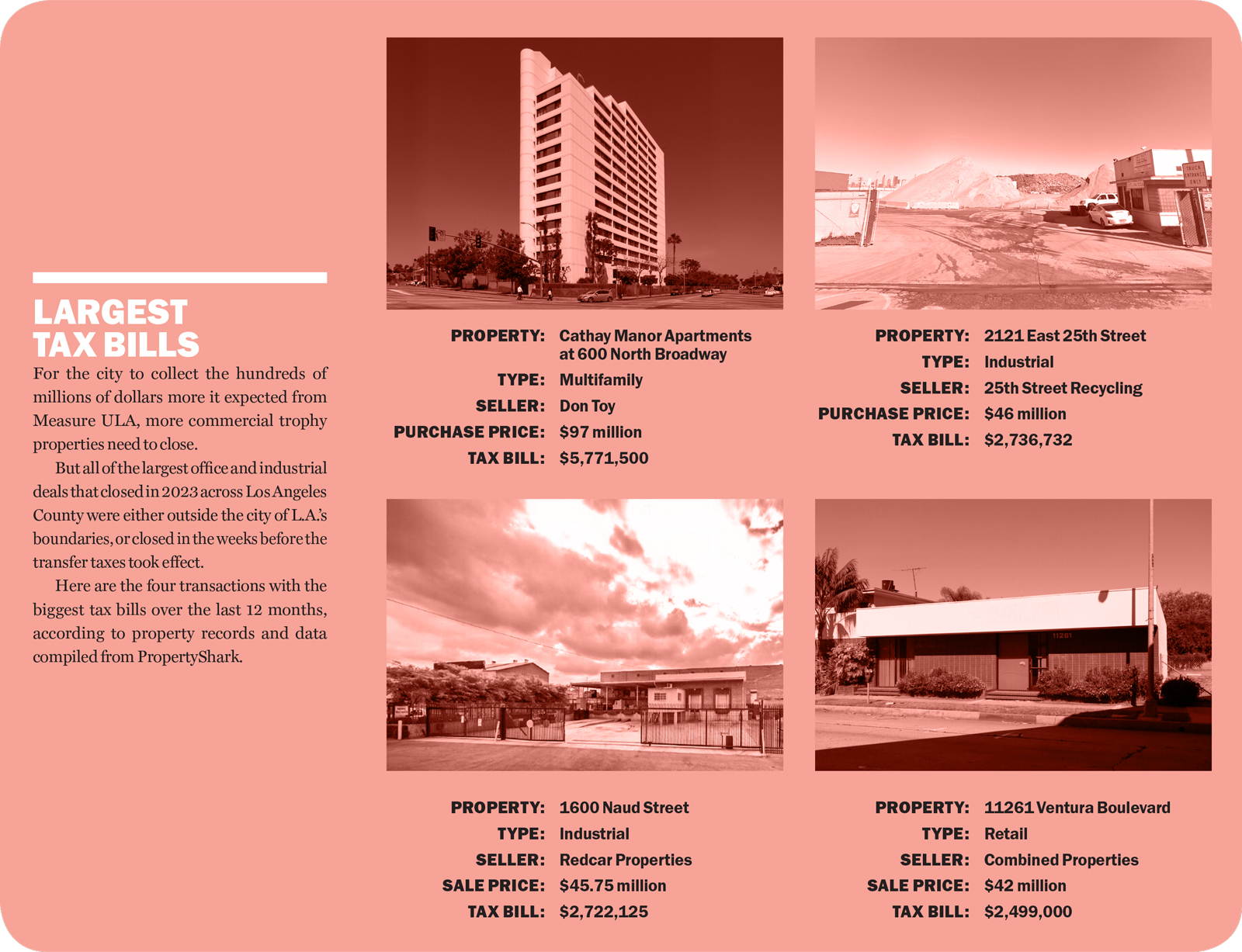A year into Measure ULA, a stiff real estate market in the city
Residential and commercial sales have both collapsed

Los Angeles’ burden
The taxes were supposed to be a boon for the city of Los Angeles. With a pumping luxury market and frequent commercial sales over $5 million, adding city transfer taxes on those sales seemed like a no-brainer for city officials, on top of the county’s existing 1.1 percent tax.
“If approved, it will raise an estimated $900 million annually,” a University of California Los Angeles report on the tax, known as Measure ULA, assured in October 2022. Those funds would go toward building affordable housing.
The city dialed it down a bit: In light of the new taxes and interest rates rising in 2022, maybe some property owners would be put off selling. The city pegged its own estimate at $672 million, about 5 percent of its total revenue stream.
Both the measure’s drafters and the city vastly underestimated property owners’ reaction.
In the year since the transfer taxes went into effect, both commercial and residential sales have stalled. Institutional office sellers, developers and homeowners came to the same conclusion: They will not sell or buy.
Instead of $900 million or $671 million, the city of L.A. has brought in $173.6 million through the new transfer taxes, just 25 percent of its own estimate, as of March 8, according to data from the city controller’s office.
“The idea that it would create an economic windfall for the city and not create this impediment to transactions or transaction volume … ” Eric Sussman, an adjunct professor at UCLA’s Anderson School of Management said. “Now the city is saying, ‘Oops.’”
The transfer taxes have mostly impacted commercial sales across the city, though it’s hard to determine what has caused the most downward pressure: rising interest rates, making it more difficult to get financing, or the transfer taxes.
In March 2023, the month before the transfer taxes began, the city of L.A. saw 73 commercial sales over $10 million close, the largest being GI Partners’ $211 million purchase of an AT&T broadcast center, according to property records and data from PropertyShark. (These figures were inflated by a rush to close before the taxes went up, but a 12-month average was not readily available.)
Three commercial sales closed over $10 million in April 2023.
The number of residential sales over $5 million across the city has dropped nearly 70 percent in the year since ULA took effect, according to Jonathan Miller at appraisal firm Miller Samuel, which tracks luxury property sales.
In the 12 months leading up to April 2023, 416 single-family homes and condos sold for $5 million or more, according to Miller. Only 125 have sold in the 12 months since Measure ULA came into effect.
ULA also came at the “worst possible time,” Sussman said.
“You were already seeing this slowdown and just adding a burden on sellers,” he said.
War chest
So far, litigation to overturn Measure ULA has failed. One major challenge is left.
In November, Californians will have the opportunity to vote on the Taxpayer Protection and Government Accountability Act.
If voters approve the ballot measure, all taxes passed by voters on a simple majority after January 2022 would be overturned, and any new local taxes proposed on ballot measures could only be passed by a two-thirds majority.
Since ULA was passed with a simple majority — 57.77 percent — in November 2022, it would be overturned if the Taxpayer Protection Act is passed. Many other local taxes would be overturned, too — Gov. Gavin Newsom has argued that it would “affect nearly every revenue source.”
Real estate companies have already poured money into the effort, according to donation records from the secretary of state.
Douglas Emmett, the Santa Monica-based multifamily and office operator run by Jordan Kaplan, and Kilroy Realty, a Los Angeles-based real estate investment trust, have each donated $1.5 million to promote the ballot measure.
Hudson Pacific, which owns offices and soundstages across Los Angeles, has donated $1 million.
Shorenstein Properties, a San Francisco-based firm that recently exited its Downtown Los Angeles office tower investment, has donated $500,000. Public Storage, the self-storage REIT out of Glendale, has also put in $500,000.
Smaller players and more private developers are getting in on the ballot measure, too.
C.J. Segerstrom, a real estate developer out of Orange County known for building South Coast Plaza, has donated $100,000 to the effort. R.W. Selby, a multifamily owner and manager, has donated at least 10 times, for a total of about $56,000. Probity International, a Beverly Hills-based developer that has Rodeo Drive holdings, has pumped $20,000 in.
Other real estate donors include Tejon Ranch’s Norman Metcalfe ($2,500), Kamyar Shabani ($5,000) and Bradford Pearl at NewMark Merrill ($250).

Nonprofits, deeds-in-lieu and other loopholes
When Hudson Pacific Properties and Macerich sold a 700,000-square-foot office campus on Los Angeles’ Westside for $700 million, they did not have to pay the 5.5 percent transfer tax.
It was not trickery, nor a nifty accounting trick. The two had just managed to find an exempt buyer: the University of California system.
“Any entity or agency exempt from the City’s taxation power under the California or U.S. Constitutions” is exempt from Measure ULA, according to the city’s finance department. The U.C. system is one of those entities.
If it had been subject to Measure ULA, Hudson Pacific and Macerich would have had to pay another $38.5 million in taxes. That bill would have pushed the city’s collected revenue over the $210 million mark.
The city has laid out a number of buyers that are exempt from Measure ULA. Those include nonprofits that have a history of developing or managing affordable housing, and nonprofit that have less than $1 billion in assets.
The issue for sellers is finding one of those buyers.
“There are not too many nonprofits around to buy,” Jake Glaser, a multifamily broker at Lyon Stahl Investment Real Estate, said. “It’s very hard to execute.”
Glaser sold a warehouse near Downtown Los Angeles this year after marketing it for sale for a long time.
“Because of the ULA transfer tax, the owner needed an astronomical price,” he said. “We never thought a sale would happen.”
The broker had originally folded the ULA tax into the asking price.
But then a nonprofit buyer came into view with an all-cash offer. The buyer qualified for the exemption.
“It was a no-brainer for the seller, and one of those needle-in-a-haystack buyers,” he said. “We struck gold.”
The loophole is not a guarantee.
When Relevant Group sold the Morrison Hotel in Downtown Los Angeles for $12.4 million in December, the hotel developer still had to cough up $708,500 in city transfer taxes even though the buyer was the AIDS Healthcare Foundation, a nonprofit that has experience developing affordable housing. It’s unclear why the group was not exempted.
Deeds-in-lieu of foreclosure are also exempted from Measure ULA.
Shorenstein Properties sold the AON Center in Downtown L.A. to Carolwood, run by Adam Rubin and Andrew Shanfeld, for $146 million.
But because the December sale was structured as a deed-in-lieu of foreclosure, relieving Shorenstein Properties of unpaid debt, no transfer tax was paid on it, according to property records.





